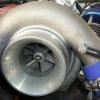What is the difference in performance between plumb back and atmospheric valves?
Announcements
-
Similar Content
-
Latest Posts
-
By drifter17a · Posted
Update: smoke test all pipes no issues cleaned reservoir fluid put in ( dexron 3 atf) steering turn side to side and could hearing gurgling from steering rack which I assumed was air lock, opened one of the steering rack connections and could see loads of air getting pushed out( not sure if you meant to do that / whether it will re introduce air into system) anyways, loads of side to side sound was gone. Turned car on, pump was slightly ( barely) wining so turned side to side few more turns and fluid level when car on was almost none in resorvoir which I guess is normal if car is one. Turned car of and fluid was gushing out. Almost 200-300cc was pushed out. Repeated engine off side to side followed by engine on and same result going mad now. It seems system is either sucking air in whilst on or there is tons of air which I am not giving it enough time to bleed. Thoughts? would it work like brake caliper if I open steering rack copper pipes and let gravity pull all air out? or maybe have a restriction somewhere? What is the red circled item, could that be blocked? It i -
Yeah, the plan is to just put some black rubber vacuum line caps over them to "hide" them a bit I don't want to trim them in cause I need to put the OEM box back on at some stage
-
Plug and play. Need a tune. It's a PowerFC, same as any other PFC, just not needing an AFM.
-
Genuine GTR seat? There are none you would actually want for <$3k a pair.
-






Recommended Posts
Create an account or sign in to comment
You need to be a member in order to leave a comment
Create an account
Sign up for a new account in our community. It's easy!
Register a new accountSign in
Already have an account? Sign in here.
Sign In Now